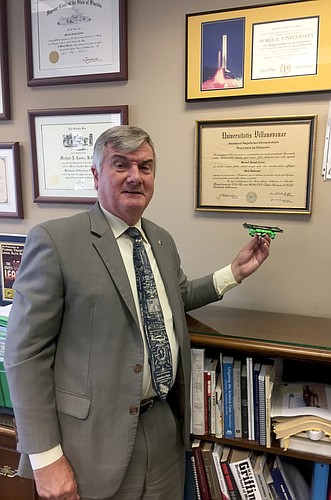Growing up with a father working for Boeing as a mechanical engineer, aviation was in Michael Corso’s blood. He flew his first plane at age 14, and later piloted F4 Phantom fighter jets while in the Air Force.
Little could he have known that as an attorney and aerospace engineer, he would combine his rare skill set into a niche specialty with the Fort Myers law firm of Henderson, Franklin, Starnes & Holt.
How niche and special? Corso, who has been with the 95-year-old firm for 40 years, is a sought-after presenter in the emerging, but still rare, area of drone law. Most of his practice in that area is as a consultant to insurance companies and businesses that use drones for a variety of reasons. But the realm is ever-expanding, given millions of drones nationwide are used by businesses and individuals.
"It’s more of a consulting role with businesses that are considering whether or not to bring drone operations in-house or hire a company that will have the licensing to fly them, and working on agreements,” says Corso. “Realtors use them a lot, and I'm not so sure they are all within the bounds of the law.”
Corso concedes his choice of practice speciality is unusual. “The American Bar Association does have an aviation law section, and I am a part of that,” says Corso. “There are firms getting more focused on drones, particularly in larger communities there are attorneys who have some background in that, but nobody can have much because it’s so new.
“Now, how many are also aerospace engineers? I might be in the minority,” he said.
Corso earned his aerospace engineering degree in 1971 at Purdue University. Recognizing a flattening in the aerospace industry at the time — Boeing, for example, was building subway trains for the city of Boston instead of commercial airliners — he earned a law degree at Villanova University in 1974 ub his hometown of Philadelphia. He enlisted in the Air Force soon after graduating, served four years, and moved to Fort Myers in 1978 to begin his law career.
At Henderson Franklin he initially focused his practice on trial law, mostly defending firms against lawsuits and claims, particularly in cases where his engineering background could be applied. His aerospace engineering expertise has also opened doors.
Drones are different. That’s because, he says, both the law and the awareness thereof lags behind the growth in drone popularity. For example, Corso says, the Federal Aviation Administration controls all air space 400 feet and higher, which identifies the legal ceiling for drone operations. Additionally, drones may not be flown within a 5-mile radius of any airport. Both restrictions are no doubt frequently violated, and enforcement is practically nonexistent.
Corso recently received a call from the homeowners association at the Fort Myers community of Paseo inquiring about the legality of a resident flying a drone there. It was determined the neighborhood is 4.7 miles away from Southwest Florida International Airport and, technically, illegal for drone flight.
Privacy is also a legal matter, says Corso, if an image that can be considered harmful is captured from above private property. Enforcement, though, is another matter.
“The feds are looking to state and local law enforcement to enforce these laws, but they are busy enough chasing bad people out there that they are not willing to get into drones," he says. "If you had somebody flying one over your house and you called local law enforcement, they’ll come by probably at some point, but I’m not sure what they will do when they get there. The drone will be long gone.”
And because there are no identification numbers on drones, if found they are next to impossible to track to their owners. In 2016, the FAA began requiring drone registration for personal or business use. Corso says over a six-week period, 325,000 registrations were received.
“But you only had to register once even if you had 10 drones, and not everybody registers," he says. "There are millions of those things out there.”
Corso says he's yet to defend a company or individual for damages related to drones. For now, it’s more about preventing such claims. Considered “aircraft,” they are excluded from most homeowners and business insurance policies.
“Business owners have gone to their insurance carriers and said they would like to use drones in their operations and would like them to be covered,” says Corso. “Many of the major carriers have tinkered with their policies to provide coverage, so I have consulted with some of the insurance companies on this issue.”






